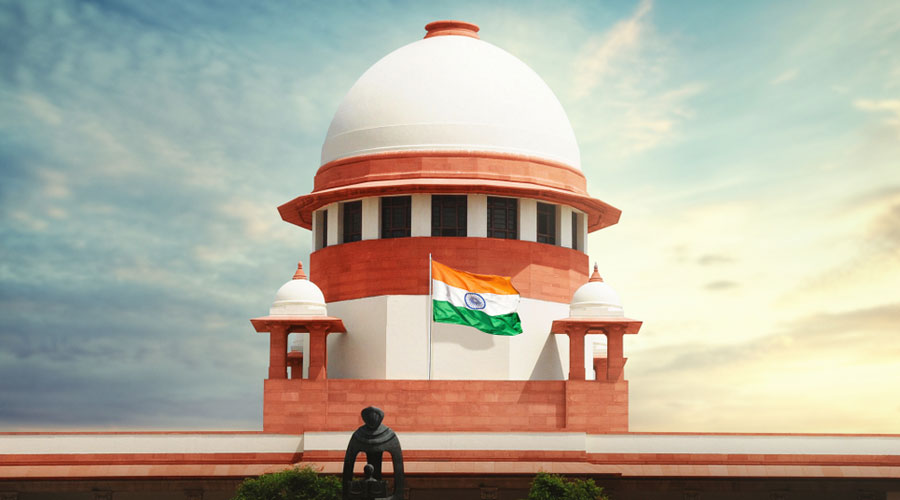The Supreme Court on Tuesday sought the Centre’s stand on keeping pending sedition cases in abeyance and not registering fresh cases till the government re-examines the colonial-era penal law.
The court agreed that a re-look at the sedition law should be left to the Centre, as the Narendra Modi government had argued before it through an affidavit.
However, the court expressed concern at the continuous abuse of the provision and suggested that guidelines be issued to stop the abuse or the law put aside till it had been reassessed.
“You have used the word ‘competent forum’ (Parliament) and will re-examine it. Why not the central government through its ministry issue a direction to the states that the matters under Section 124A (sedition) of the IPC be kept in abeyance till the issue is under reconsideration?” the apex court told solicitor-general Tushar Mehta.
The law officer said the Supreme Court had never ever passed an order directing that a penal provision not be used.
“We are not talking about all provisions. Section 124A only,” the bench said.
The top court, which was to decide whether a three- or five-judge bench should hear the batch of pleas challenging the validity of the sedition law, took note of the fresh stand of the government that it wanted to “re-examine and reconsider” it.
The Centre’s affidavit had said it had decided to “re-examine and re-consider” the sedition law at an “appropriate forum”, in a change of stand just two days after stoutly defending the law, and also urged the Supreme Court not to “invest time” in examining its validity once again.
Quoting the Centre’s affidavit, which referred to Prime Minister Modi’s views on matters such as the shedding of “colonial baggage”, protection of civil liberties and respect for human rights, a bench headed by Chief Justice N.V. Ramana said: “What we feel is that the State has said they want to do something…. We should not be unreasonable.”
The bench, which also had Justices Surya Kant and Hima Kohli, added: “Our specific query is on two issues. One is about the pending cases and the second is, how the government will take care of future cases till the reconsideration. These are two issues. Nothing else.”
It asked solicitor-general Mehta to inform it about the Centre’s stand on Wednesday when the court could pass some orders.
Referring to the possible “misuse” of the provision, the bench said even the attorney-general had exclaimed how the sedition law could be invoked even for chanting the Hanuman Chalisa. The court asked the Centre to come up with a response.
“We are making it very clear. We want instructions.
We will give you time till tomorrow. Our specific queries are: one, about pending cases and the second, as to how the government will take care of future cases...,” the bench said.
Mehta claimed that the states filed FIRs and conducted investigations and that the Centre had no role in this. He also said that there were constitutional courts for granting remedies against any misuse of the sedition law based on the facts of each case.
“We cannot ask everyone to go attend the courts and be in jail for months. When the government itself has shown concern about misuse, then how will you protect them? We have to balance. There are people who are jailed and people who are going to be booked.… Please make your stand clear on this,” the bench said.
A total 356 cases of sedition were registered and 548 people arrested between 2015 and 2020, according to data compiled by the National Crime Records Bureau (NCRB). However, just 12 persons arrested in seven sedition cases were convicted in this six-year period.
The court asked how much time the government would take to reconsider the law. The solicitor-general said he could not give an accurate time but the process had been initiated and from “the tenor and spirit of the affidavit”, it was evident that there was an application of mind involved in the process.
The bench said that even in the 1962 judgment in the Kedar Nath Singh case, the sedition provision had been “melted down”, but at the ground level the local police were using it.
“Unless you (Centre) issue a direction that you are reconsidering the provision and no cases be registered, they will not act,” the bench said.
At the outset, senior lawyer Kapil Sibal, appearing for the petitioners, opposed the Centre’s response, saying the court cannot be asked to stop hearing a constitutional challenge.
The sedition law states: “Whoever, by words, either spoken or written, or by signs, or by visible representation, or otherwise, brings or attempts to bring into hatred or contempt, or excites or attempts to excite disaffection towards the Government established by law… shall be punished with imprisonment for life, to which fine may be added, or with imprisonment which may extend to three years, to which fine may be added, or with fine.”
The Union home ministry had in an affidavit filed on Tuesday said the decision to re-examine the sedition law was in tune with the views of Prime Minister Modi on shedding the “colonial baggage”, noting he was in favour of the protection of civil liberties and respect of human rights and in that spirit, over 1,500 outdated laws and more than 25,000 compliance burdens had been scrapped.
“The PM believes that at a time when the country is marking Azadi Ka Amrit Mahotsav (75 years of Independence), we need to, as a nation, work even harder to shed colonial baggage that has passed its utility which includes outdated laws, colonial laws, and practice,” the affidavit said.
Various offences that were causing “mindless hindrances” to people have been decriminalised, it added.
Asserting that it was cognizant of various views and concerns about civil liberties, the Centre said it was committed to protecting the “sovereignty and integrity of this great nation”.
In a written submission on May 7, the Centre had defended the sedition law and the 1962 verdict of a constitution bench upholding its validity, contending that it had withstood “the test of time” for about six decades and the instances of its abuse would never be a justification for reconsideration.











